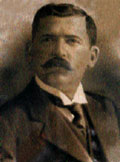The son of a Minas Gerais politician, Venceslau Brás Pereira Gomes studied law in São Paulo graduating in December 1890. His career began at the cities of São Francisco de Monte Santo and Jacuí, where he served as public prosecutor. Brás was twice elected to the state legislature of Minas Gerais (1892-1898). He emerged as a promising regional politician when he assumed the secretaryship of the Interior of Minas Gerais (7 Sep 1898 - 7 Sep 1902). Brás was chosen federal deputy (1903-1908) and acted as a majority leader in the Chamber of Deputies. After the death of João Pinheiro da Silva, Brás was elected president of the State of Minas Gerais (3 Apr 1909 - 7 Sep 1910) to complete the term. Elected Vice President of the Republic (15 Nov 1910 - 15 Nov 1914) on the ticket with Hermes Rodrigues da Fonseca, Brás preferred to stay away from national politics and left for Itajubá, where he lived most of his term. In the presidential election of 1914, Brás was elected without organized opposition after his only opponent, Rui Barbosa, withdrew his candidacy. Upon his installation as president on 15 Nov 1914, Brás faced a political crisis resulting from the disputed election of governor in the State of Rio de Janeiro, when Feliciano Sodré and Nilo Peçanha contested the results. The rebellion of peasants in Paraná and Santa Catarina (Revolta do Contestado) lasting for four years was finally suppressed with the aid of aircrafts and troops. A remarkable achievement of social policy was the Civil Code promulgated on 1 Jan 1916. World War I negatively affected imports to Brazil forcing the government to look for measures motivating industrialization. Brazil preserved neutrality during most of World War I, but its relations with Germany were severed after the sinking of Brazilian ships by German submarines. On 26 Oct 1917 the National Congress authorized, and the president signed, a decree declaring that Brazil was in a state of war with Germany. Brazil's involvement in the war was limited to sending military doctors to Europe and patrolling the Atlantic Ocean. The last year of the Brás administration was marked by an epidemic of the "Spanish" influenza. At the end of his term of office, Brás retired to Itajubá. As an elder statesman, he was a member of the Executive Committee of the Republican Party of Minas Gerais (Partido Republicano Mineiro) (1919-1931). He initially supported Getúlio Dorneles Vargas and engaged in the creation of several ephemeral political movements, but eventually opposed the dictatorship. In 1934 his name was mentioned as a possible presidential candidate. In early 1947 he retired from politics. [1] [2] |

